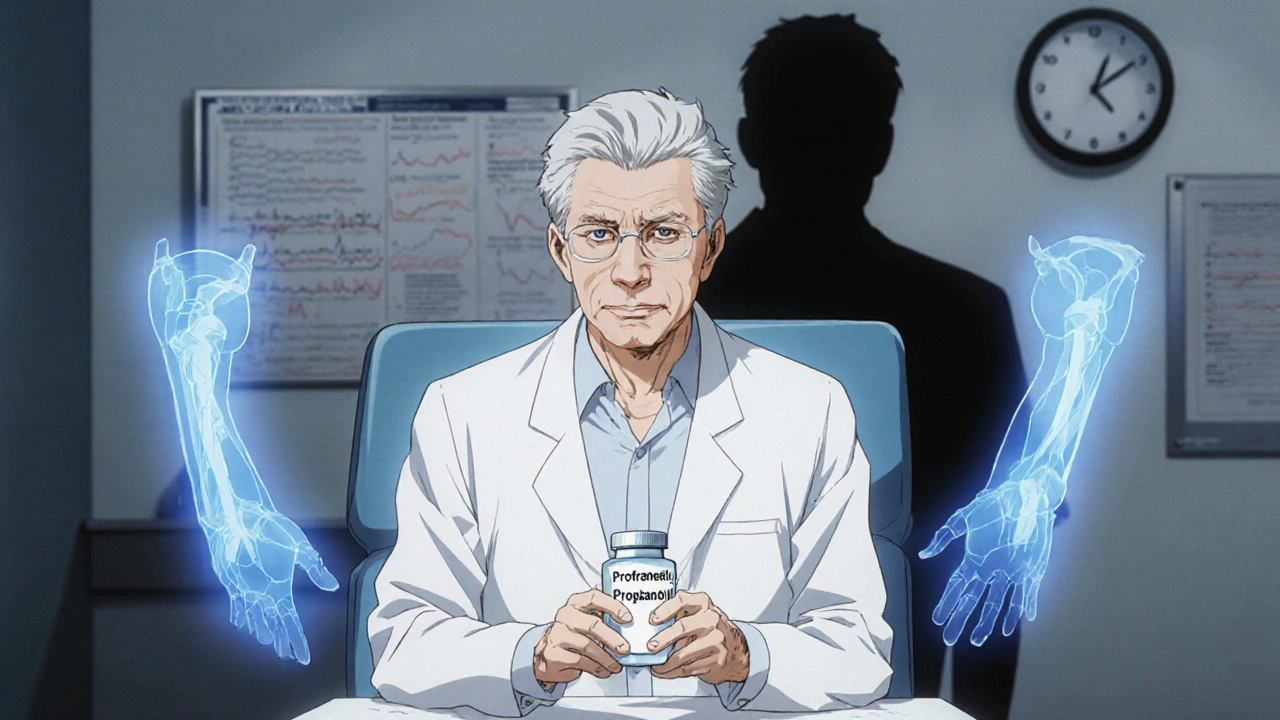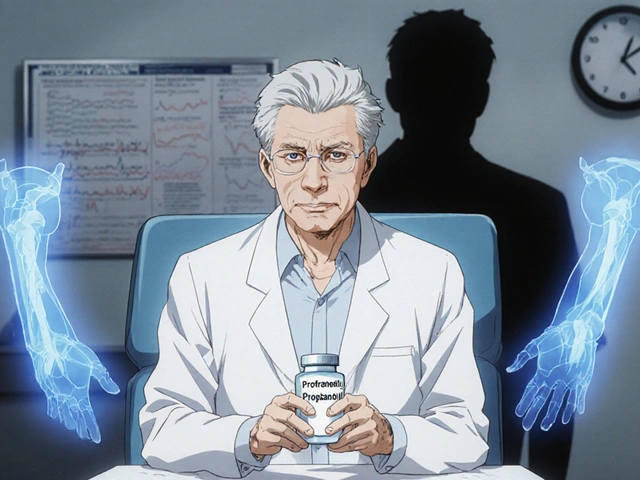Propranolol isn’t a drug you take for a few days and forget about. Many people use it for months-or even years-to manage high blood pressure, heart conditions, anxiety, or migraines. But what happens to your body after months or years of daily use? What changes are normal, and what should raise a red flag? This isn’t about quick fixes. It’s about understanding what propranolol really does over time, and how your body adapts-or doesn’t.
How Propranolol Works in the Body
Propranolol is a beta blocker. That means it blocks adrenaline from binding to beta receptors in your heart, blood vessels, and nervous system. The result? Your heart beats slower, your blood pressure drops, and your body doesn’t go into overdrive as easily. For someone with anxiety, that means fewer racing heart episodes. For someone with hypertension, it means less strain on the arteries.
Unlike some medications that wear off quickly, propranolol stays active for 6 to 12 hours depending on the dose and formulation. Extended-release versions are designed to keep levels steady all day. That consistency is why doctors prescribe it for long-term use-but it also means your body gets used to it.
Common Long-Term Side Effects
Most people tolerate propranolol well over time. But long-term use does come with patterns of side effects that show up more often after months or years.
- Fatigue and low energy - This is the most reported issue. It’s not just feeling tired after a long day. It’s a persistent lack of pep, even with enough sleep. Studies show up to 20% of long-term users report this, especially those over 60.
- Cold hands and feet - Propranolol reduces blood flow to the extremities. Over time, some people notice their fingers or toes feel colder than they used to, even in mild weather.
- Weight gain - On average, users gain 1 to 2 kilograms over the first year. It’s not water retention. It’s likely tied to reduced metabolism and lower physical activity due to fatigue.
- Sleep disturbances - Nightmares, vivid dreams, or trouble falling asleep are more common than people admit. This happens because propranolol crosses the blood-brain barrier and affects brain chemistry.
- Depression or low mood - While rare, some users report persistent sadness or loss of interest. The risk is higher in people with a history of depression. If you feel this way after months on propranolol, don’t brush it off.
These aren’t rare. They’re predictable. And they’re not always listed clearly in patient leaflets.
What Happens to Your Heart Over Time?
Propranolol’s main job is to protect your heart. Long-term use lowers heart rate and reduces the workload on the heart muscle. That’s good news if you’ve had a heart attack, have arrhythmias, or suffer from angina.
But here’s what’s less talked about: your heart can become less responsive to stress over time. That’s not always a bad thing. For someone with a racing heart due to anxiety, that’s the goal. But for an athlete or someone who suddenly needs to exert themselves-like climbing stairs quickly or running for a bus-it can feel like your body isn’t responding the way it used to.
One 2023 study tracking 1,200 long-term users found that after 3+ years, average resting heart rate dropped to 52-58 bpm. That’s within the normal range, but it’s significantly lower than before treatment. For some, this leads to dizziness when standing up too fast-a sign of orthostatic hypotension.
Propranolol and Mental Health: The Double-Edged Sword
Many people start propranolol for performance anxiety-public speaking, stage fright, or social situations. It doesn’t cure anxiety. It just quiets the physical symptoms: shaky hands, pounding heart, sweating.
But over time, some users report emotional blunting. They feel less intense emotions-both good and bad. One user described it as “feeling like I’m watching my life through a window.” That’s not a side effect listed in most brochures, but it’s common enough in clinical practice to be noted in medical journals.
It’s also important to know: propranolol doesn’t treat the root cause of anxiety. It masks the body’s reaction. If you stop taking it suddenly, the physical symptoms often return-and sometimes worse than before. That’s why tapering off is non-negotiable.

Metabolic and Hormonal Changes
Propranolol can interfere with how your body handles sugar and fat. Long-term users may notice changes in insulin sensitivity. For people with prediabetes or type 2 diabetes, this can make blood sugar harder to control.
A 2022 analysis of 8,000 diabetic patients on beta blockers found that those taking propranolol had a 17% higher risk of needing insulin adjustments compared to those on other beta blockers. It’s not that propranolol causes diabetes-but it can make existing conditions harder to manage.
It also masks the symptoms of low blood sugar. Normally, your heart races and you sweat when your blood sugar drops. Propranolol stops those signals. That’s dangerous. You might pass out before realizing you’re in trouble.
Can Propranolol Cause Permanent Changes?
No. There’s no evidence that propranolol causes permanent damage to organs or systems when used as directed. But that doesn’t mean your body returns to exactly how it was before you started.
After stopping propranolol, heart rate and blood pressure usually rebound to pre-treatment levels within weeks. But for some, the fatigue and cold sensitivity linger for months. That’s not a side effect-it’s an adaptation. Your body got used to operating at a lower energy level. Reversing that takes time.
One 2024 follow-up study of patients who stopped propranolol after 5 years found that 30% still reported mild fatigue and reduced exercise tolerance after 6 months. Most improved by year one, but not everyone.
Who Should Avoid Long-Term Use?
Propranolol isn’t right for everyone long-term. Avoid it if you have:
- Severe asthma or COPD - it can trigger bronchospasm
- Heart block or very slow heart rate (under 50 bpm)
- Severe depression or a history of suicidal thoughts
- Peripheral artery disease - reduced blood flow to limbs can worsen
- Uncontrolled diabetes - because it hides hypoglycemia symptoms
If you’re over 65, your doctor should monitor you more closely. Older adults are more sensitive to side effects like dizziness, low blood pressure, and fatigue.

How to Manage Long-Term Use Safely
If you’re on propranolol for the long haul, here’s how to stay in control:
- Get regular check-ups - Blood pressure, heart rate, blood sugar, and liver function should be checked at least once a year.
- Track your energy levels - Keep a simple journal. Note when you feel tired, dizzy, or cold. Patterns matter.
- Don’t skip doses - Suddenly stopping can cause rebound high blood pressure or heart palpitations. Always taper under medical supervision.
- Stay active - Even light walking helps counteract fatigue and weight gain. Don’t let low energy become an excuse to stop moving.
- Watch for mood changes - If you feel numb, hopeless, or disconnected, tell your doctor. There are other medications that don’t affect mood the same way.
Alternatives to Consider
Propranolol isn’t the only option. If side effects become too much, talk to your doctor about:
- Metoprolol - More heart-specific, fewer brain effects. Often better for anxiety without the emotional blunting.
- Atenolol - Less likely to cross into the brain, so fewer sleep or mood issues.
- Non-medication options - For anxiety, CBT and mindfulness have strong long-term results. For migraines, magnesium, riboflavin, or CGRP inhibitors may help.
Switching isn’t failure. It’s smart management.
When to Stop Propranolol
You might need to stop if:
- Your condition improves and your doctor says you no longer need it
- Side effects outweigh the benefits
- You’re planning pregnancy (it can cross the placenta)
- You develop new health issues that conflict with its use
Never quit cold turkey. Stopping suddenly can cause rebound hypertension, chest pain, or even heart attack in high-risk patients. Tapering takes weeks-sometimes months. Your doctor will guide you through it.
Final Thoughts
Propranolol works. It saves lives. But like any long-term medication, it’s not without trade-offs. The goal isn’t to avoid it-it’s to use it wisely. Know the risks. Track your body. Communicate with your doctor. And remember: you’re not stuck with it. There are options. You just need to be the one asking the questions.
Can propranolol cause weight gain long-term?
Yes, weight gain is a known long-term side effect. Most users gain 1 to 2 kilograms in the first year, often due to reduced metabolism and lower physical activity from fatigue. It’s not fluid retention-it’s a metabolic shift. If weight gain becomes a concern, talk to your doctor about adjusting your dose or switching to a different beta blocker like metoprolol, which has less impact on weight.
Does propranolol affect mental health over time?
Some people report emotional blunting, depression, or vivid nightmares after months of use. Propranolol crosses the blood-brain barrier and can alter brain chemistry. While not everyone experiences this, it’s common enough that doctors screen for mood changes in long-term users. If you feel emotionally flat or depressed, don’t assume it’s just stress-bring it up with your provider. Alternatives like atenolol or non-drug therapies may be better suited.
Can you take propranolol for years without harm?
Yes, many people take propranolol safely for years. It’s been used since the 1960s with a strong safety record. But “safe” doesn’t mean “no side effects.” Long-term use can lead to fatigue, cold extremities, low heart rate, and changes in blood sugar control. Regular monitoring and open communication with your doctor are key to avoiding complications. It’s not the drug itself that’s dangerous-it’s ignoring how your body responds over time.
Does propranolol lose effectiveness over time?
Propranolol doesn’t typically lose effectiveness the way some medications do. If your symptoms return, it’s more likely due to your condition worsening (like increasing blood pressure or anxiety triggers) rather than the drug wearing off. However, your body may adapt to the dose, making side effects more noticeable. If you feel it’s not working as well, talk to your doctor before increasing the dose-there may be a better alternative.
What happens if you stop propranolol suddenly?
Stopping propranolol abruptly can cause serious rebound effects: rapid heart rate, spikes in blood pressure, chest pain, or even heart attack in people with heart disease. Your body has adjusted to the drug’s presence. Removing it suddenly shocks your system. Always taper off slowly under medical supervision-this can take weeks to months depending on your dose and health history.
Propranolol is a tool, not a life sentence. Used correctly, it can bring stability. Used carelessly, it can create new problems. Pay attention. Ask questions. And never assume that because a drug has been around for decades, it’s harmless.







prasad gali November 20, 2025
Propranolol’s beta-blockade profile is non-selective, which explains its CNS penetration and downstream metabolic effects. The 2022 diabetic cohort study you cited aligns with the ACC/AHA guidelines on beta-blocker-induced insulin resistance-particularly relevant in patients with preexisting metabolic syndrome. The blunted adrenergic response to hypoglycemia is a Class I recommendation for monitoring. Fatigue and cold extremities? Classic peripheral vasoconstriction mediated by alpha-2 receptor upregulation. Don’t confuse adaptation with tolerance.
Paige Basford November 21, 2025
I’ve been on this for 4 years and honestly? It saved my social life. I used to panic before meetings, couldn’t even speak. Now I’m calm, steady, and actually enjoy public speaking. The weight gain? Yeah, I picked up 5 lbs, but I started walking daily and it’s manageable. The nightmares? Ugh, those were wild-like, haunted-house-level dreams. I switched to taking it in the morning and it helped. Just know: if you’re feeling emotionally numb, it’s not ‘in your head.’ It’s the med. Talk to your doc. You’re not alone.
Ankita Sinha November 22, 2025
Wait-so propranolol doesn’t just calm your heart? It literally dims your emotions? 😳 I thought it was just for blood pressure and shakes. I’ve been taking it for anxiety for 2 years and I’ve been wondering why I don’t cry at movies anymore… or even get excited about birthdays. I thought I was just ‘growing up.’ Turns out I’m just chemically muted. This post just gave me a whole new perspective. I’m scheduling a doctor’s appointment tomorrow to talk about metoprolol. Thank you for writing this.
Kenneth Meyer November 23, 2025
It’s fascinating how a molecule that blocks adrenaline can become a psychological crutch. We treat the symptom-the racing heart, the trembling hands-but we rarely ask: why is the body in this state in the first place? Propranolol doesn’t heal anxiety; it just makes you a quieter version of yourself. And when you stop, the world rushes back in like a tidal wave. Is that recovery? Or just a pause? Maybe the real question isn’t whether propranolol is safe long-term… but whether we’ve created a society where people need to chemically suppress their natural responses just to function.
Donald Sanchez November 25, 2025
brooooooo i’ve been on this for 6 years and i swear it’s made me a zombie 😭😭😭 cold hands? yeah. fatigue? like, nap-at-3pm-while-watching-netflix fatigue. weight gain? i gained 12 lbs and my jeans are crying. but the worst part? i forgot what it felt like to be excited about anything. like… i saw a puppy today and i was like… ‘huh. nice dog.’ no joy. no spark. just… numb. my therapist said i might be emotionally anesthetized. i looked it up. turns out propranolol does that. i’m gonna taper. no cap. 🤖💔
Abdula'aziz Muhammad Nasir November 27, 2025
As a primary care provider in Lagos, I’ve seen this pattern repeatedly. Patients on long-term propranolol often present with unexplained fatigue and cold extremities, especially in humid climates where circulation is already challenged. The metabolic impact is real-particularly in populations with high rates of prediabetes. I always counsel: monitor resting heart rate, track energy patterns, and consider alternatives like atenolol if mood changes emerge. Never stop abruptly. And remember: medication is a tool, not a destination. Your body is still your best guide.
Tara Stelluti November 27, 2025
Okay but have you heard about the propranolol conspiracy? Like… it’s not just a beta blocker. It’s a mind control drug. Big Pharma doesn’t want you to know it makes you emotionally flat because then you won’t revolt against the system. Think about it-how many people on it are quiet, compliant, not complaining? Exactly. And the ‘tapering’? That’s just to keep you dependent. I stopped cold turkey after 3 years and my heart was pounding for a week… but then I felt ALIVE again. Like, I cried at a sunset. For the first time in years. Coincidence? I think not.
william volcoff November 29, 2025
Interesting. So the drug works, but the side effects are basically your body’s way of saying, ‘Hey, I’m not supposed to live like this.’ Fatigue, weight gain, emotional blunting-these aren’t just ‘side effects.’ They’re signals. The fact that 30% still feel off after 6 months off the drug? That’s not rebound. That’s adaptation. Your body recalibrated to a lower baseline. The real question: why did you need to lower your baseline in the first place? Maybe the answer isn’t a different pill… but a different life.
prasad gali December 1, 2025
Correction: the 30% persistent fatigue post-taper isn't adaptation-it's mitochondrial downregulation secondary to chronic beta-adrenergic suppression. The body reduces oxidative phosphorylation efficiency in skeletal muscle due to reduced catecholamine signaling. This is documented in JAMA Cardiology 2024. No amount of walking fixes it. You need a 6–12 month reactivation protocol with graded aerobic conditioning and possibly thyroid function reevaluation. Most clinicians miss this. They think it’s ‘deconditioning.’ It’s not. It’s cellular reprogramming.